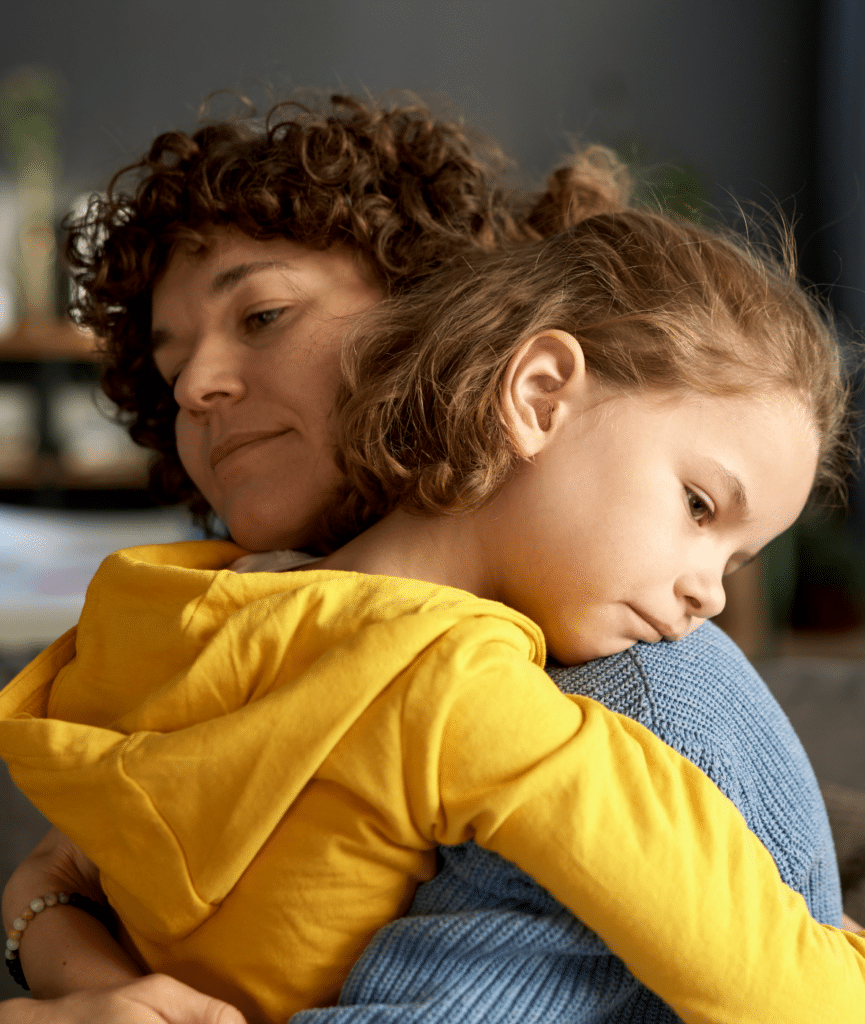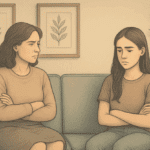How to Explain a Parent’s Mental Health to Children

If you are a parent struggling with a mental health condition, how will you tell your child? Almost 20% of parents with children under 18 years old in the U.S. have a mental health condition, and if you’re one of them, you may be worried about how to bring the subject up, or if you even need to.1
It can be one of the most challenging conversations you have, but also one of the most essential. Kids can tell when something is different, and if they aren’t told explicitly what it is then they may come up with their own ideas or conclusions about what is happening.
Explaining mental illness to children in an age-appropriate, gentle, and empathic way can help clear up any of the confusion or misconceptions they may have, and instead bring about clarity, helping the child to feel safe, secure, and supported.
On this page, you will discover the importance of talking about your mental health with your child, how to talk to children about a parent’s mental health condition based on the child’s age, and tips on discussing some common mental health conditions. By the end, we hope you will feel more confident about having these conversations with your children with honesty and compassion.

Understanding a Child’s Perspective
Children can often pick up on how their parents feel and sense that something is wrong, even if it isn’t said aloud. Studies show that children can sense when their parents are stressed or depressed, or when something is being deliberately hidden from them.2-5 That’s why it is important to talk about your mental health condition with your child. Let’s prepare by looking at how a child might feel when you first tell them about your illness.
Your child might feel a mix of emotions. They might feel angry at you for having an illness, or at the world for unfairly hurting you. Your child might be scared about what your condition means for the future – if it means your relationship might change, or if you won’t be able to look after them anymore.
They might blame themselves for your condition, or feel embarrassed that their mum or dad is different from other parents. They could feel sad because you are unwell. They could even feel relief because the things they have been picking up on have a name and a reason rather than being something they can’t understand.4
Your child could have a mix of many different feelings which is why it is important to have compassionate family discussions on mental health. You can explain what is happening, and answer any questions they might have. We will look at how to answer some of those questions once we dive into how to have the conversations.
Having Age-Appropriate Mental Health Conversations
Toddlers
Young children usually need fewer details because they are less able to understand. Use simple language to explain how your condition affects you. Maybe you cry or don’t smile much because you feel depressed. Maybe you bite your nails or avoid going out because you feel anxious.
School-Age Children
Older children might want more details or ask more questions. Being able to talk to them about your condition in simple terms can help with questions like this. You could compare mental illness with physical illness, like catching a cold or a cough. Sometimes you need to take medicine, or if the illness gets bad, you may have to visit a hospital for help getting better.
Teenagers
Teens usually take in more information and ask more challenging questions. Teens may also be aware of mental illnesses already through talking with friends, seeing it represented in TV shows, or from information on the internet. It’s important to have a two-way conversation so that they feel able to ask questions.
Reducing stigma in family mental health talks and challenging misconceptions they may have means they may feel more able to come to you in the future with any questions about your mental health condition, or if they are struggling with something.
When you have these conversations about mental health, notice how your child is feeling. If they look upset or worried, take time to reassure them that you are being helped for your condition, and to answer questions they have. Always reassure them that it is not their fault that you are ill, and that you are getting help.
How to Explain Specific Mental Health Conditions
When educating children on psychological disorders, it’s good to be knowledgeable about and comfortable with discussing your condition.6 Focus more on the feelings and how symptoms show themselves in you, rather than technical jargon, and choose a calm and safe place to talk where you won’t be disturbed.
Let’s look at a few different mental health conditions, and how you could talk about them with children.
Discussing Bipolar Disorder With Children
Talk about the basics of your condition, and let them know that there are treatments that help you. Have some examples ready for how to describe bipolar disorder, like emotions being like waves that rise and dip, and that with bipolar those waves can become much higher and lower than normal, as though they were waves during a storm. Let them know they can always ask you more questions if they think of any.8
Talking to Kids About a Parent’s Depression
Helping Kids Cope With a Parent’s Schizophrenia
Managing Conversations About a Parent’s Anxiety
Your child may already have some understanding about anxiety – if they get nervous about tests or exams, or if they are scared of the dog that lives down the street. You can use these to segway into your own anxiety condition.
You could talk about your physical symptoms, such as a racing heart as though you’ve been running a race, or you could talk about your mind feeling like it’s buzzing with many thoughts. You could even share with them some breathing exercises you’ve been shown, or encourage them to do some yoga with you.
Explaining Obsessive-Compulsive Disorder to Kids
There are different ways to explain OCD to a child, depending on their age. If they are young, you could compare it to a gnat bite – when you scratch the bite the itch goes away, but as soon as you stop scratching, it comes back.
But instead of it being an actual gnat, there’s a thought in your head starting the ‘itch’, and you do certain things to ‘scratch’ the itch to feel better.10 Or, that your brain is playing a ‘trick’ on you, making it seem like something bad will happen if you don’t do a certain ritual, for example, washing your hands.
Answering Children’s Questions About Mental Illness
Children are curious by nature and may be inquisitive when you talk about your mental health condition. Here are some common questions you might be faced with (and some example answers):
“What is depression?”
When faced with this question, you can say:
“When people feel depressed, their brain works differently. They think, feel, and behave differently than they would when they are well.”
“What made you unwell?”
If your child asks this question, you can answer:
“I’m not too sure. There are lots of different things that can cause this condition, and sometimes the cause isn’t known.”
“Can the doctors fix you?”
When asked this question, you can say:
“They can help me feel better. Sometimes I take medicine, and sometimes I talk to people at the hospital or someone who specializes in the illness, like a therapist.”
“Can I catch it?”
If your child is curious about this, you can respond:
“No, mental health conditions aren’t like colds or coughs, you can’t catch them like germs.”
“If you’ve got it, will I get it when I’m older?”
In answer to this question, you can say:
“No one can know for sure if they will get ill. It’s just like any other illness, we can’t know. But if something does happen, it can be treated and made better.”
“Is it my fault?”
Many children assume they may play some part when their parents are unwell. If your child asks this, you can answer:
“No, there is nothing you have done that caused this.”
“What can I do to make you better?”
When faced with this question, you can say:
“I’m so grateful that you want to help – it’s lovely you care so much and want to help. It’s the adults, like doctors and therapists, who are responsible for helping treat my condition. Although you can’t fix me, just knowing that you understand is a big help.”
Finding Support for Your Child
There are different ways of supporting kids with mentally ill parents. Open communication is key, so encourage them to talk about how they feel, if they have any questions, or if they are being affected by their parent’s illness.
Counseling and Therapy Services
Sometimes, it may feel difficult for your child to talk to you about how your health affects them. In this case, talking about therapy with children could be useful. Some counselors and therapists are trained and ready to listen to them and help them with their struggles.
Children’s therapy doesn’t necessarily look the same as counseling for adults – it may involve play, painting, or music, to help the child express what they need to.
Children’s Books on Parental Mental Illness
If you are looking for children’s books to help them understand their parent’s mental illness, here are a few recommendations:
- My Happy Sad Mummy by Michelle Vasiliu. Reading age preschool. This book talks about life with a parent who has bipolar disorder.
- The Huge Bag of Worries by Virginia Ironside. Reading age 6+. This is a book which explores fear and anxiety in children.
- The Colour Thief: A Family’s Story of Depression, by Andrew Fusek Peters and Polly Peters. Reading age 7+. This is a heartwarming tale to help open up conversations about depression.
- Helicopter Man by Elizabeth Fensham. Reading age 11+. This book is about Pete’s dad who is being pursued by a secret organisation and the unusual life they lead.
Reach Out to Mission Connection
If you’re struggling with your mental health, you don’t have to face it alone. Seeking out help is the first step towards feeling better, and we are here to support you.
Here at Mission Connection, we have a team of licensed professionals who can help you on your road to recovery. We have a range of treatments available tailored to your unique needs, including partial hospitalization programs (PHP), intensive outpatient programs (IOP), and a range of therapy approaches including Dialectical Behavior Therapy (DBT), Cognitive Behavioral Therapy (CBT) and Mindfulness.
Cost shouldn’t be a barrier to you receiving the treatment you need, which is why we have a range of payment options available to you, which you can read more about here.
Get in contact with us now to schedule your initial consultation, where we can assess your needs and help you choose the best course of action to feel better.

References
- Stambaugh, L. F., Forman-Hoffman, V., Williams, J., Pemberton, M. R., Ringeisen, H., Hedden, S. L., & Bose, J. (2016). Prevalence of serious mental illness among parents in the United States: Results from the National Survey of Drug Use and Health, 2008–2014. Annals of Epidemiology, 27(3), 222–224. https://doi.org/10.1016/j.annepidem.2016.12.005
- Waters, S. F., West, T. V., & Mendes, W. B. (2014). Stress contagion. Psychological Science, 25(4), 934–942. https://doi.org/10.1177/0956797613518352
- American Psychological Association. (n.d.). Keep it to yourself? Parent emotion suppression influences physiological linkage and interaction behavior. https://psycnet.apa.org/doiLanding?doi=10.1037%2Ffam0000664
- Russell, T. (2024, December 24). Parenting through depression. Child Mind Institute. https://childmind.org/article/parenting-through-depression/
- Mental Health America. (2025, March 2). Parenting with a mental health condition. https://mhanational.org/resources/parenting-with-a-mental-health-condition/
- American Academy of Child and Adolescent Psychiatry. (n.d.). Talking to kids about mental illnesses. https://www.aacap.org/AACAP/Families_and_Youth/Facts_for_Families/FFF-Guide/Talking-To-Kids-About-Mental-Illnesses-084.aspx
- Emerging Minds. (n.d.). When a parent is depressed. https://emergingminds.com.au/resources/in-focus-talking-with-children-about-parental-mental-health-difficulties/publications/when-a-parent-is-depressed
- Jensen, K. (2023, June 30). 7 tips to explain a bipolar disorder diagnosis to your child. Healthline. https://www.healthline.com/health/bipolar-disorder/explaining-to-kids
- Centre for Addiction and Mental Health. (n.d.). Schizophrenia. https://www.camh.ca/en/health-info/mental-illness-and-addiction-index/schizophrenia
- KidsHealth. (n.d.). OCD (Obsessive-Compulsive Disorder) (for kids). https://kidshealth.org/en/kids/ocd.html






